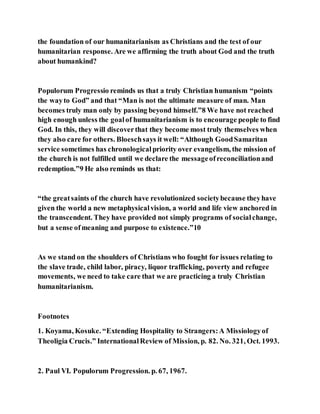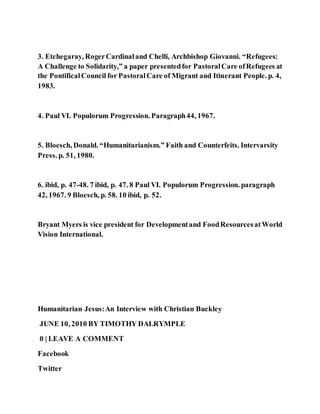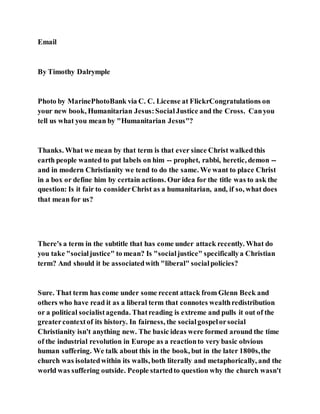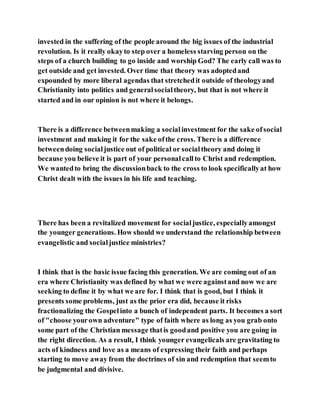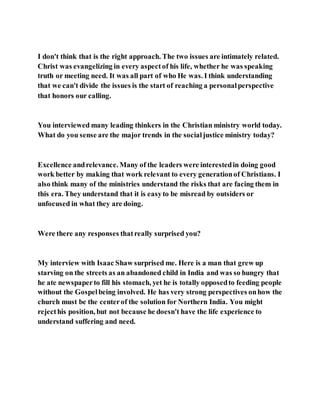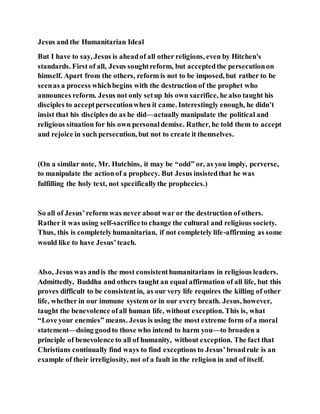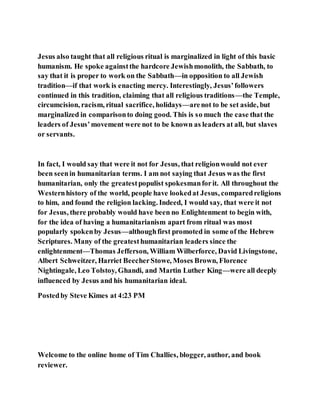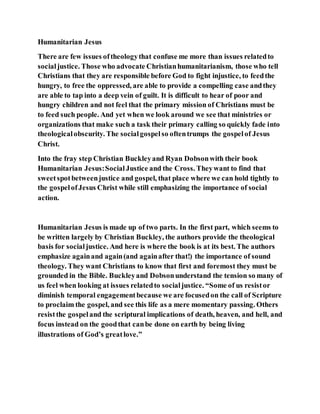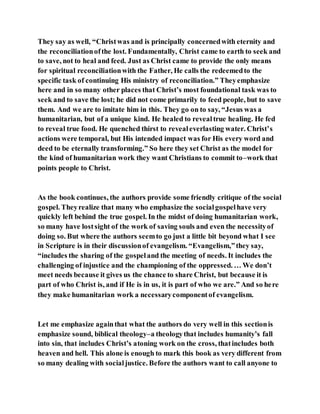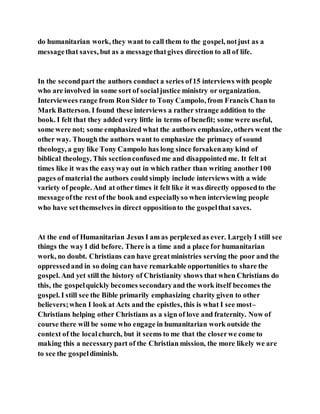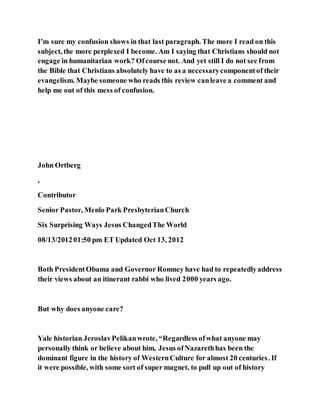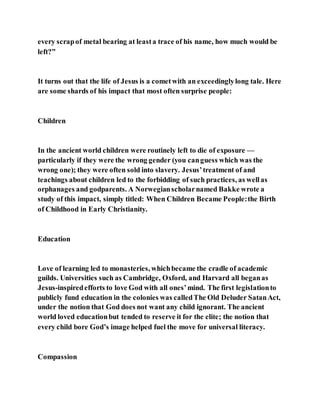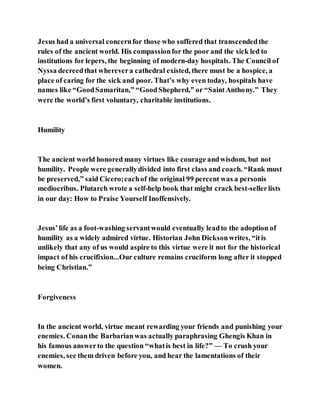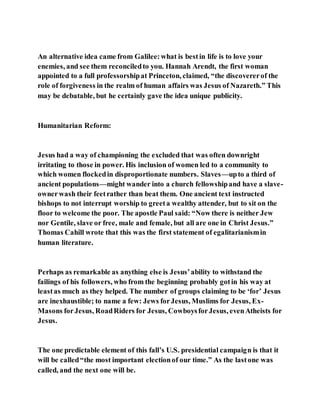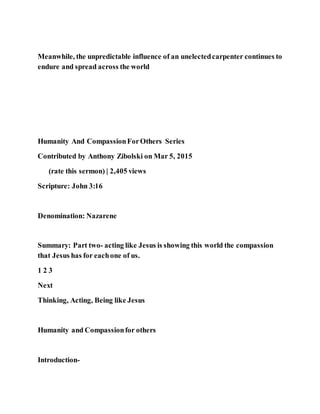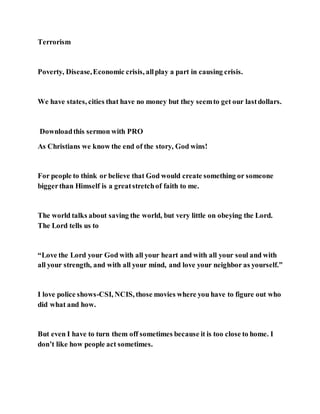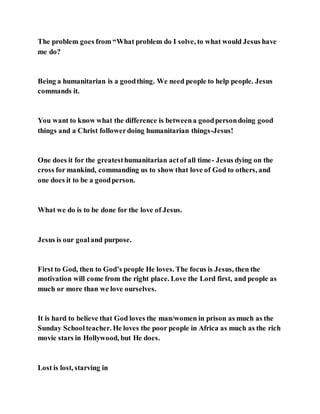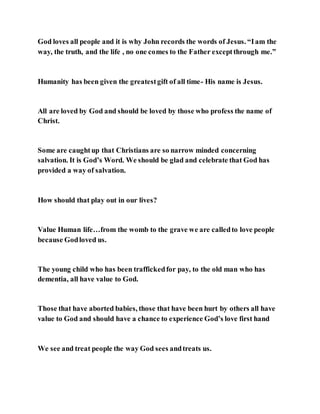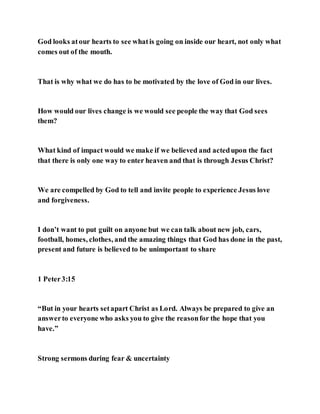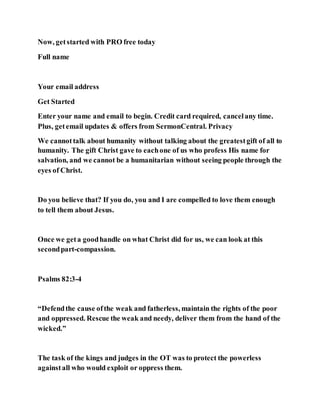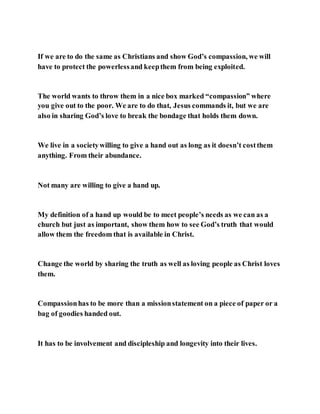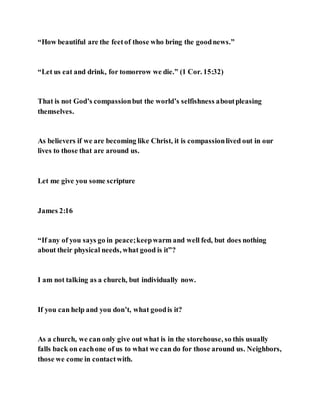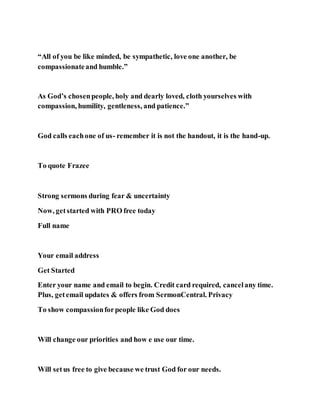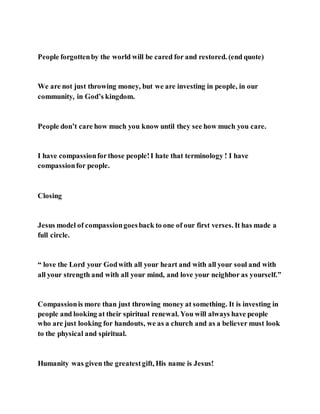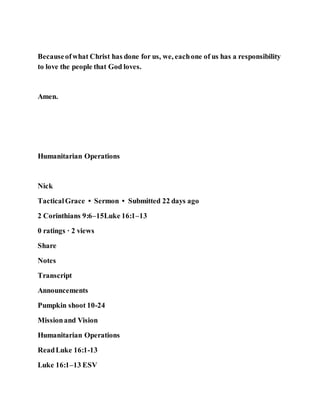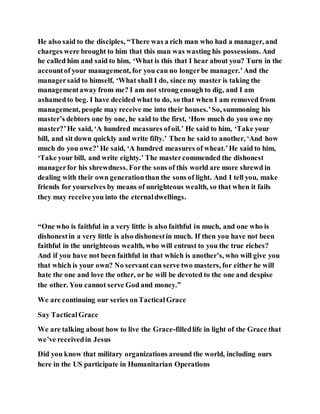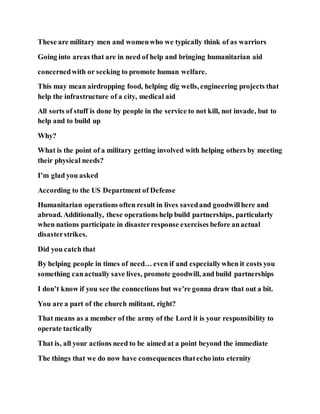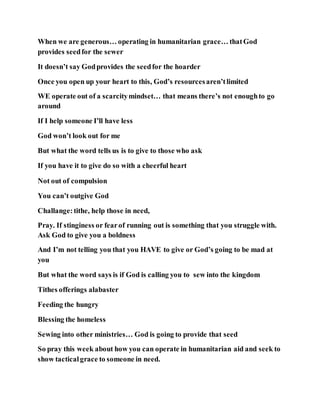The document discusses Jesus as the ultimate humanitarian, emphasizing his compassionate actions towards those in need and his personal engagement with individuals suffering from crises. It highlights the importance of humanitarian work today, encouraging readers to act with deep compassion for individuals rather than viewing them as mere statistics in a crisis. The text calls on followers of Jesus to emulate his example of selflessness and commitment to helping others, linking humanitarian efforts with the core mission of spreading the gospel.
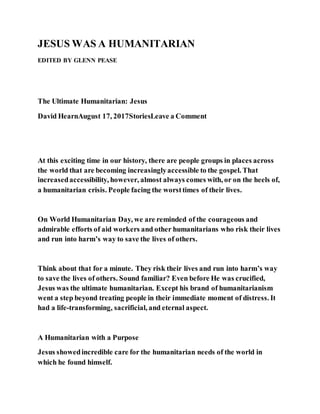
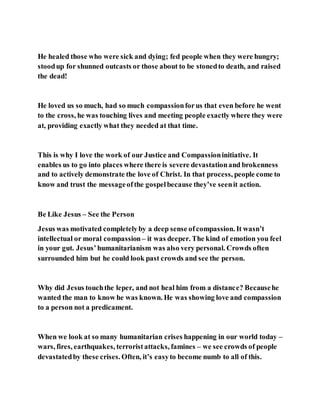
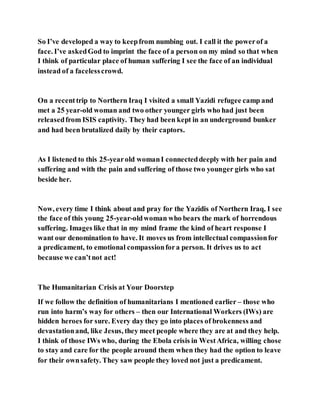
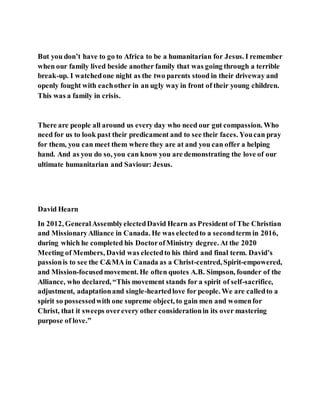
![DeepThought: Was Jesus a “humanitarian”?
humanitarian dictionary.com
– “having concernfor or helping to improve the welfare and happiness of
people. ..”
–Charity openbible.info
=>Poor/Poverty/Homeless
The Widow’s Offering Luke 21EnglishStandard Version (ESV)
biblegateway.com
”
21 Jesus[a]lookedup and saw the rich putting their gifts into the offering box,
2 and he saw a poor widow put in two small copper coins.[b] 3 And he said,
“Truly, I tell you, this poor widow has put in more than all of them. 4 Forthey
all contributed out of their abundance, but she out of her poverty put in all
she had to live on.”
“..Sellyour possessions,and give to the needy. Provide yourselves with
moneybags that do not grow old, with a treasure in the heavens that does not
fail, where no thief approaches and no moth destroys. ..”–Luke 12
“…Give, and it will be given to you. Good measure, presseddown, shaken
together, running over, will be put into your lap. For with the measure you
use it will be measuredback to you.” ..”–Luke 6](https://image.slidesharecdn.com/jesuswasahumanitarian-201103131839/85/Jesus-was-a-humanitarian-5-320.jpg)

![Jesus And The Samaritan Woman.avi
John 4 New International Version(NIV)
Jesus Talks With a SamaritanWoman biblegateway.com
“…4 Now he had to go through Samaria. 5 So he came to a town in Samaria
calledSychar, near the plot of ground Jacobhad given to his son Joseph. 6
Jacob’s wellwas there, and Jesus, tired as he was from the journey, satdown
by the well. It was about noon.
7 When a Samaritan woman came to draw water, Jesus saidto her, “Will you
give me a drink?” 8 (His disciples had gone into the town to buy food.)
9 The Samaritan womansaid to him, “You are a Jew and I am a Samaritan
woman. How can you ask me for a drink?” (ForJews do not associatewith
Samaritans.[a])
10 Jesus answeredher, “If you knew the gift of God and who it is that asks
you for a drink, you would have askedhim and he would have given you
living water.”
11 “Sir,” the woman said, “you have nothing to draw with and the well is
deep. Where can you getthis living water? 12 Are you greaterthan our father
Jacob, who gave us the well and drank from it himself, as did also his sons and
his livestock?”](https://image.slidesharecdn.com/jesuswasahumanitarian-201103131839/85/Jesus-was-a-humanitarian-7-320.jpg)

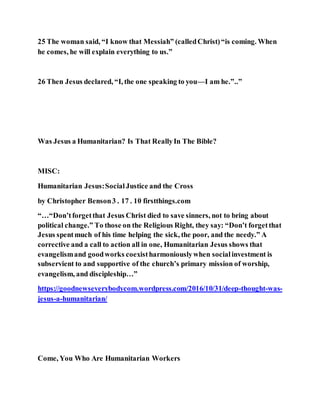
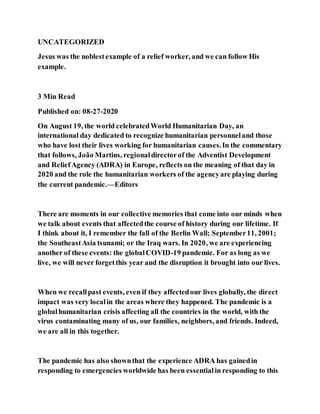
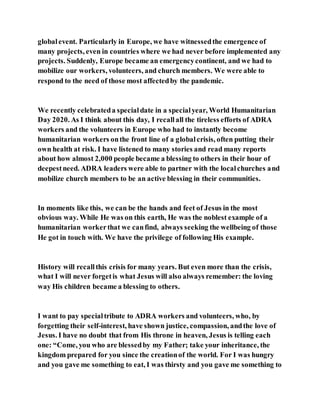
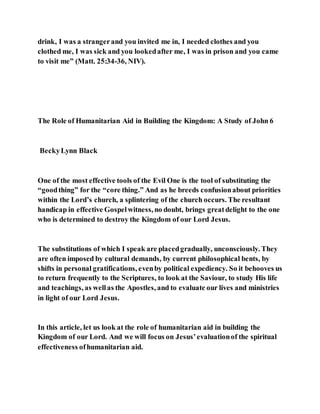
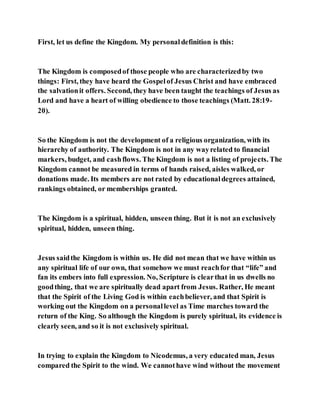
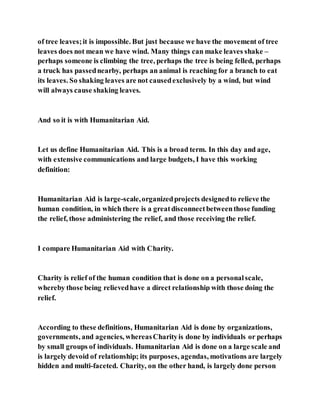
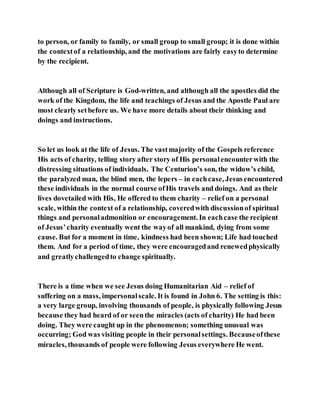
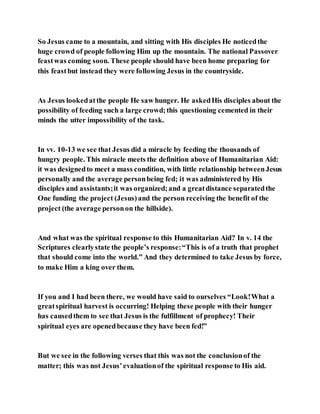
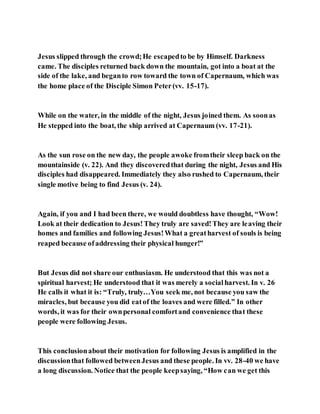
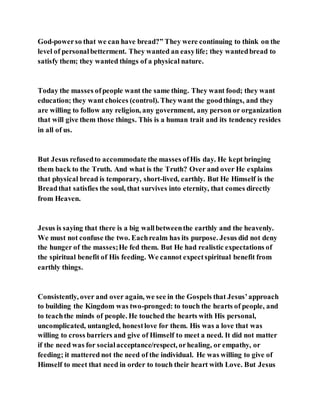
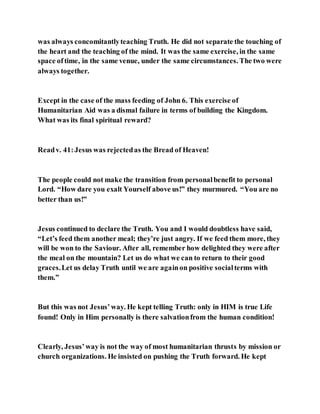
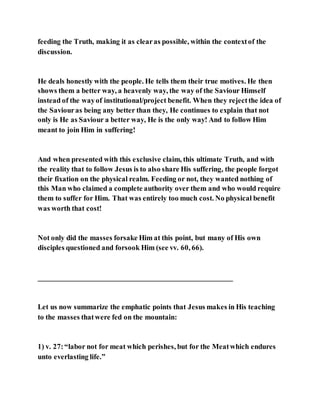
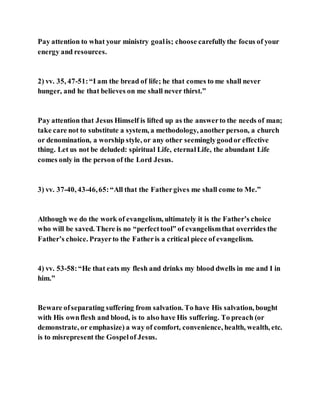
![5) vv. 61-63:“It is the spirit that quickens [makes alive]; the flesh profits
nothing. The words that I speak unto you, they are spirit, and they are life.”
Pay attention that you teachthe words of Jesus. Only through these words
does true regenerationoccur. Earthly benefits fade quickly; only Jesus’truth
makes alive.
And what is the end of this episode in Jesus’life? The masses disappeared;
many disciples fell away. When fed, they were happy to follow Jesus, evento
make Him King, so that their meals of the future would be secured. But when
challengedwith Truth, with the exclusivity of salvationthrough Jesus, with
the suffering that comes with salvation, with the power of God in choosing His
own – these truths were not palatable. They were distasteful to the life the
people wanted, so they rejectedJesus.
“Then saidJesus onto the twelve, ‘Will you also go away?’Then Simon Peter
answeredhim, ‘Lord to whom shall we go? You have the words of eternal
life’” (vv. 67-68).
Simon Peterhit the nail on the head. He saw that life is apart from food: it is
in the words of Jesus. Perhaps Peterremembered what Jesus had said before
in Matt. 6:24-31:“No man canserve two masters…takeno thought for your
life, what you shall eat, drink, or wear…isn’tLife more than these
things…your Father knows about your needs…but seek the Kingdom, seek
His righteousness…andthe needs of your life will be met by the Father.”
Ultimately the decisionis a matter of choosing masters. Do we strive in our
ministry for material things? Do we pursue the praise of the masses?Do we
aim for the blessing of governments? Or do we pursue the Commission that](https://image.slidesharecdn.com/jesuswasahumanitarian-201103131839/85/Jesus-was-a-humanitarian-22-320.jpg)
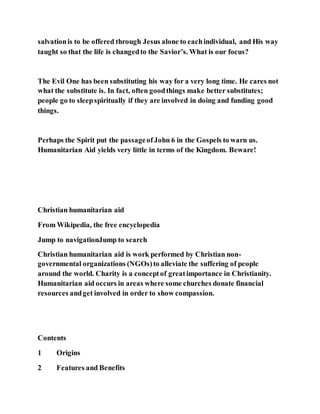
![3 Humanitarian staff
4 Intervention policies
5 Results and budgets
6 International Catholic Organizations
7 International ProtestantOrganizations
8 International EvangelicalOrganizations
9 Problems and critics
10 Further reading
11 References
12 External links
Origins
The modern conceptof Christian humanitarian aid is basedon teachings from
the Bible.[1]Charity and providing assistanceto the poor are concepts
establishedin the Old Testament.[2]According to Exodus, part of one's tithe
was devoted to the needy (orphans, widows, foreigners). In the New
Testament, Jesus taughtmuch about the subject of charity. In the Sermonon
the Mount, he called for people to help not only friends but also enemies,[3]as
well as those rejectedby society, suchas people with disabilities.[4]In the
Parable of the GoodSamaritan, he describedthe medical care paid by a
Samaritan to a Jew (both peoples were enemies), as a model of love for his
neighbor.[5][6]Paul of Tarsus has also raisedfunds for the
underprivileged.[7]
Dating back as early as the Middle Ages, Catholic monasteries andmonastic
orders have a long tradition of providing charity, asylum, and assistanceto
the poor.[8]Protestantchurches establishedthe Department of Deacons
responsible for helping the poor. Missionarysocietiesofthe 18th and 19th](https://image.slidesharecdn.com/jesuswasahumanitarian-201103131839/85/Jesus-was-a-humanitarian-24-320.jpg)
![centuries often offered humanitarian assistance in addition to their main
activity of evangelism.[8]
In the 19th century, the first Christian non-governmental organizations
(NGOs)beganemerging. YMCA, a ProtestantNGO, was created in 1844 in
London.[9] Caritas, a Catholic NGO, was founded in Cologne in 1897.[10]The
entrepreneurial culture of Evangelicalchurches also led to their creationof
multiple NGOs.[11]
Like the humanitarian movement, Christian NGOs attractedmore attention
in the 1970s. Some ChristianNGOs, such as those run by evangelicaldoctors
providing medicalassistancein impoverished countries, are recognizedfor
their contributions to development.[12][13][14]
Features and Benefits
A Christian humanitarian NGO has at leastone of the following traits:[8]
Affiliation with a Christian religious organization
Explicit references to a Christian religion in its statutes
Financialsupport from a Christian religious organization
Selectionofits Boardof Directors orteams based on Christian principles or
religious affiliation
Decision-making basedonChristian religious principles
Affiliation with localChristian churches across the world often make it
possible for Christian NGOs to work in countries or regions that are
otherwise difficult for governmental or international organizations to access.
The international network of many Christian religions allows their NGOs to](https://image.slidesharecdn.com/jesuswasahumanitarian-201103131839/85/Jesus-was-a-humanitarian-25-320.jpg)
![gather significantfunding and publicity to promote their humanitarian
actions acrossthe world.[8]
Humanitarian staff
In some Christian NGOs, the staff is not only Christian.[15]However,
common spiritual values are a common feature among Christian NGO
employees and volunteers.[16]According to Christian aid workers, their
commitment is motivated by spiritual values of compassionand
mercy.[17][18][19]In some NGOs, suchas Mercy Ships, all employees are
volunteers and have to pay for accommodationand food, as well as work for
free.[20]
Intervention policies
The majority of Christian NGOs help everyone, regardless ofreligion.[21]
With the growthof secularizationin some countries, some Christian NGOs
have downplayed their religious identity.[22] In some NGOs this depends on
the cultural contextof the national antenna.[23]
Contrary to certainclichés, many EvangelicalNGOs do not mix humanitarian
and evangelization.[24]But on the other hand, some evangelicalNGOs can
not provide help without accompanying evangelization. The diversity of
evangelicalmovements makes both scenarios possible. In some parts of the
world, as on the African continent, localculture places a greatdeal of
importance on spiritual things, which makes it difficult for some people to
understand or acceptthe work of Humanitarian NGOs that do not display
their religious identity.
Results and budgets](https://image.slidesharecdn.com/jesuswasahumanitarian-201103131839/85/Jesus-was-a-humanitarian-26-320.jpg)
![In 2007, ChristianNGOs comprised 57.4%of the NGOs affiliated with the
United Nations.[25]
According to a British study by Elizabeth Ferris, published in 2005 in the
periodical International Review of the RedCross", ChristianNGOs have
large budgets and provide considerable financialsupport worldwide.[8]This
same study gives the following figures:
NGOs relatedto the World Council of Churches and those of the group of
Caritas Internationalis spend over a billion dollars a year in aid and
development.
The Lutheran World Federationhas a budget of $73 million for aid and
development.
According to a 1953 study, religious NGOs gave 90%of the assistance
provided after World War II.
According to William Headley of (Catholic Relief Services), 1/3 ofthe persons
living with AIDS in the world are treated with the help of the Catholic
Church.
According to sociologistSébastienFath, Evangelicalchurches and their
respective NGOs developan international humanitarian entrepreneurship
that influences policy decisions.[26]Therefore,they are unavoidable
geopoliticalplayers in the humanitarian field.
International Catholic Organizations
Among the most important International Catholic Humanitarian NGOs, there
are Caritas Internationalis and Emmaus International.[27]
International ProtestantOrganizations](https://image.slidesharecdn.com/jesuswasahumanitarian-201103131839/85/Jesus-was-a-humanitarian-27-320.jpg)
![At the level of international Protestanthumanitarian NGO, there are church-
related organizations suchas Lutheran World Relief and United Methodist
Committee on Relief.[28]The largestNGO humanitarian Protestant
international not directly attachedto a church is the YMCA.[29]
International EvangelicalOrganizations
At the beginning of the 20th century, the American Baptist pastorWalter
Rauschenbusch, leaderof the SocialGospelmovement, developedthe
importance of socialjustice and humanitarian actions in Evangelical
churches. [30]The majority of evangelicalChristianhumanitarian
organizations were founded in the secondhalf of the 20th century. [31] Among
those with the most partner countries, there was the foundation of World
Vision International (1950), Samaritan's Purse (1970), MercyShips (1978),
Prison FellowshipInternational (1979), InternationalJustice Mission
(1997).[32]
Problems and critics
Conflicts of collaborationhave occurredbetweenCatholic NGOs and non-
confessionalNGOs in the fight againstAIDS, mainly because ofdifferent
views on the use of condoms.[33]
In Bangladesh, some Christian NGOs are criticized for their activity of
evangelism. According to the sociologistGeoffreyMartin, there is no overall
policy, but some employees of Christian NGOs distribute bibles to the people
they assist.[11]Evangelicalaidhas been criticized by more traditional
Christian NGOs because they have not separatedevangelismand
humanitarian aid, which could affectall Christian humanitarian NGOs.[8]
It has been difficult for some Christian and Muslim NGOs to collaborate.[34]
In areas of armed conflict, some Christian NGOs have been criticized for not
respecting the principle of neutrality.[8]](https://image.slidesharecdn.com/jesuswasahumanitarian-201103131839/85/Jesus-was-a-humanitarian-28-320.jpg)
![Some have criticized the actions of Mother Teresa as "animperialist
enterprise of the Catholic Church, againstan Easternpopulation, in an
oriental city" and a "cult of suffering" little concernedabout hygiene .[35]
According to Tamsin Bradley, who performed a study in Rajasthan(India),
faith and compassionoccasionallyresultin members of Christian NGOs
overlooking the actualneeds of people they assist, as wellas their long-term
needs.[36]
Further reading
Christian Buckley, Ryan Dobson, Humanitarian Jesus:SocialJustice and the
Cross, MoodyPublishers, USA, 2010
MichaelBarnett, Janice Gross Stein, SacredAid: Faith and
Humanitarianism, Oxford University Press, UK, 2012
Bruno Duriez, François Mabille, Kathy Rousselet,Les ONG confessionnelles:
Religions et actioninternationale, Editions L'Harmattan, France, 2007
Humanitarian Jesus:SocialJustice and the Cross
by Christian Buckley, Ryan Dobson
A resurgence ofthe SocialGospelis energizing many evangelicals, but what
does the Bible sayabout the role of humanitarian works in the Christian life?
As new covenant believers, Christians are calledto a specific central task:to
be ministers of God's message ofsalvationfor sinners. At the same time, the
New Testamentjustifies nearly every concernof the revitalized SocialGospel.
Care for the poor and needy, reconciliationof socialand racialdivisions, and
nurture for the sick and abused -- all canbe biblical and Christ-honoring
activities.](https://image.slidesharecdn.com/jesuswasahumanitarian-201103131839/85/Jesus-was-a-humanitarian-29-320.jpg)
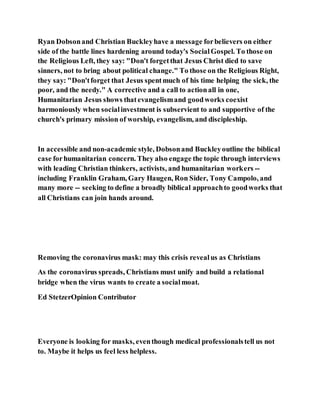

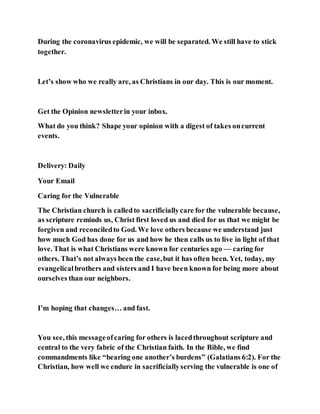
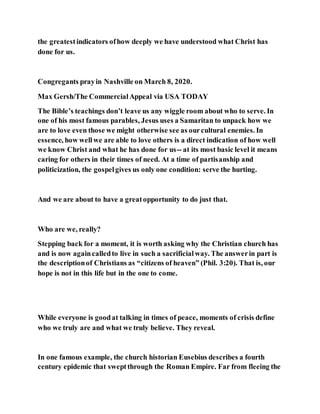
![cities or shutting off their homes from others, Eusebius records that “allday
long [Christians] tended to the dying and to the burial, countless numbers
with no one to care for them. Others gather togetherfrom all parts of the city
a multitude of those withered from famine and distributed bread to them all.”
As a result, Eusebius concludes, “[the Christians’] deeds were on everyone's
lips, and they glorified the godof the Christians.”
The Backstory:Coronavirus facts don't incite panic. Justthe opposite. Facts
fight fear.
Facedwith what was likely a far more severe pandemic than our own, 4th
century Christians modeled a faith that is truly compelling. That pandemic
revealedwho Christians really were — this one will probably do so as well.
Who are we, followers ofJesus in 2020?Are we driven by a desire for political
powerand gain, or will we be those who show and share the love of Jesus in
the midst of this now-growing crisis?
We will know — soon. Masks willrun out and masks will come down.
Perhaps it’s time to take them off anyway and show who Christians really are.
I pray we will look more like our Jesus, andless like our worst impulses.
It’s time to take off the masks.
Ed Stetzeris the Executive Directorof the WheatonCollege Billy Graham
Center, which recently launched CoronavirusAndTheChurch.Com, in](https://image.slidesharecdn.com/jesuswasahumanitarian-201103131839/85/Jesus-was-a-humanitarian-34-320.jpg)
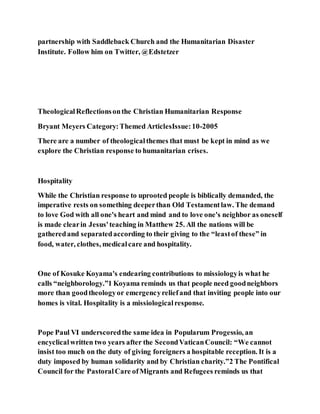
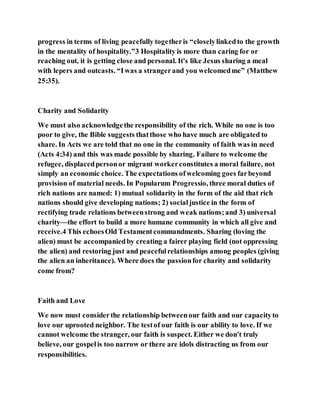
![But, more importantly, faith is the precursor to being able to truly love. Our
faith in the Lord of grace and the sanctifying Holy Spirit is what holds the
promise that we can love unselfishly. David Bloeschsums: “Faithalone
justifies; love attests that faith is alive. Faith is personal; love is social. Faithis
the foundation; love is the goal. Faith is the root; peace, joyand love are the
fruits.”5 Our Christian faith and its vitality and sustenance are the foundation
of our humanitarian response.
True Humanitarianism
Finally, we must clarify our theologyof humanitarianism. Bloeschwarns of
the temptation to reduce a truly Christian understanding of humanitarianism
to its modern secularform:
“The object of humanitarianism (in its secularsense)is not to identify with the
world in its shame and affliction (James 1:27), nor to permeate the world with
the leavenof the gospel, but to remold the world in the image of enlightened
humanity. Humanitarianism is a liberal form of religion emphasizing service
to humanity above all other concerns….The goalis the greaterhappiness of
man, not the glory of God.”6
The dangerof reduced understanding of humanitarianism is not only how it
affects our actions, but how it affects our thought life: “When concernfor
socialimprovement pre-empts the hope for the righteousness ofthe Kingdom,
we are in the humanitarian [Westernliberal democratic]rather than the
biblical thought-world.”7
The antidote to a false humanitarianism is to be sure that our anthropologyis
theologicallysound. The truth is that God createdhuman beings as free
beings and that we are made in God's image and are here for a purpose. We
are to first glorify God and then we are to make the earth productive. This is](https://image.slidesharecdn.com/jesuswasahumanitarian-201103131839/85/Jesus-was-a-humanitarian-37-320.jpg)
